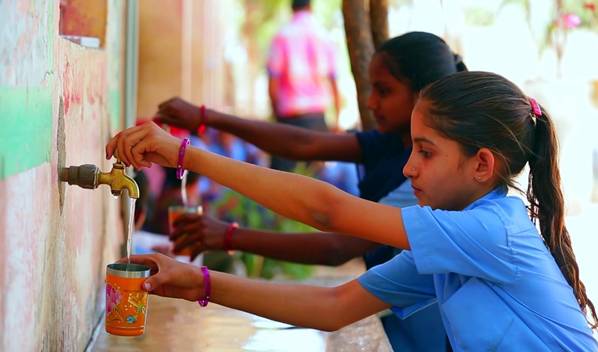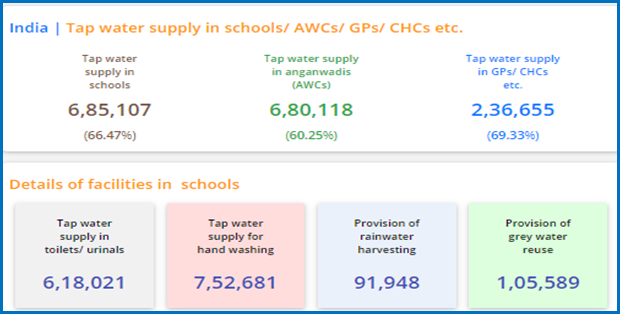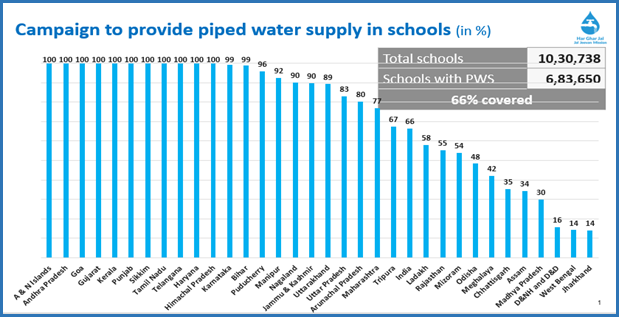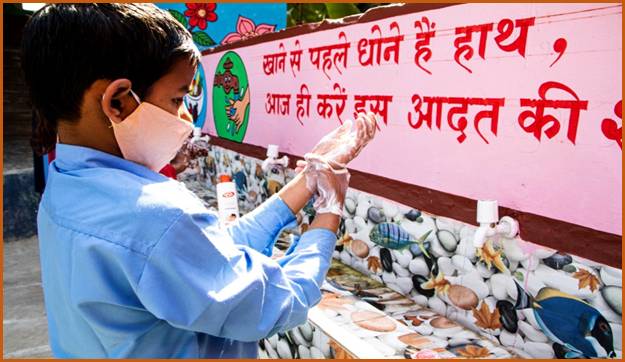In the wake of Covid-19 pandemic, to ensure clean tap water supply to children in schools, anganwadi centres and ashramshalas (residential schools) for their wellbeing and better health as envisioned by Prime Minister Shri Narendra Modi, on 2nd October, 2020, a campaign was launched to make provision of tap water supply in these institutions. In less than ten months since the launch of this campaign, provision of tap water has been made in 6.85 lakh (66%) schools, 6.80 lakh (60%) anganwadi centres (AWCs)and 2.36 lakh (69%) Gram Panchayats and Community Healthcare Centres (CHCs) in villages across India.
In Andhra Pradesh, Goa, Gujarat, Haryana, Himachal Pradesh, Kerala, Punjab, Sikkim, Tamil Nadu, and UT of Andaman & Nicobar Islands, provision of clean tap water supply in all schools, ashramshalas and anganwadi centres have been made, despite Covid-19 pandemic and lockdown resulting into repeated disruptions.Once schools and ashramshalas open, safetap water to children will greatly contribute in their better health, improved sanitation and improved hygiene.

To ensure safe tap water to children, on 29th September 2020, Prime Minister Shri Narendra Modiappealed to all States and UTs, to reach every school and anganwadi centre with tap water connection on priority basis. To translate the vision of the Prime Minister, a 100-days campaign was launched by the Union Minister Shri Gajendra Singh Shekhawat on 2nd October, 2020 to bring awareness and a sense of urgency to provide clean drinking water to children across the country. National Jal Jeevan Mission reached out to States/ UTs to ensure that during the campaign period, Gram Sabhas are convened and resolutions passed to provide safe water in all schools, ashramshalas, anganwadi centres, Gram Panchayat buildings and healthcare and wellness centres.
In less than 10 months, as a result of this sustained campaign, 6.85 lakh schools, 6.80 lakh anganwadi centres and 2.36 lakh GPs/ CHCs have tap water supply for drinking water and cooking mid-day meal, 6.18 lakh schools have tap water in toilets/ urinals and 7.52 lakh schools have tap water hand washing facility. This provision of tap water supply not only contributes to better health of children but also prevents spread ofwater-borne diseases. To ensure water availability and treatment of used water, in 91.9 thousand schools, rain water harvesting and in 1.05 lakh schools, grey water management systems have been put in place. This will not only boost the water availability but also create awareness among children and inspire them to learn water management in their growing stage.

Due to unsafe water, poor sanitation and hygiene, children are susceptible to water-borne diseases like diarrhea, dysentery, cholera, typhoid, etc. Repeated infections due to consumption of unsafe water and poor sanitation in formative years of children may lead to adverse health effects like stunting. In areas where water sources are contaminated with Arsenic, Fluoride, heavy metals, etc.,prolonged consumption of contaminated water may lead to serious health issues. Therefore, under this campaign, tap water supply of prescribed quality is being provided for drinking and cooking mid-day meal, for handwashing and in toilets/ urinals of schools and anganwadi centres.

Acknowledging the need of ‘potable piped water’ to children, teachers, support staff, anganwadi workers and the care givers for repeated hand washing to prevent Covid-19 pandemic, the mission is pushing for providing safe piped water supply to all schools, ashramshalas and anganwadi centres at the earliest.
On 15 August, 2019, at the time of launch of Jal Jeevan Mission, out of 18.98 Crore rural households in country, only 3.23 Crore (17%) had tap water connections. Despite Covid-19 pandemic and lockdown disruptions, Jal Jeevan Mission provided 4.57 Crore tap water connections in last 23 months. As a result, today, 7.80 Crore (41.14%) households have tap water supply. Goa, Telangana, Andaman & Nicobar Islands and Puducherry have achieved 100% household connection in rural areas and has become ‘Har Ghar Jal’.
Following the principle of Prime Minister’s vision of ‘SabkaSaath, Sabka Vikas, Sabka Vishwas’, the motto of the Mission is that ‘no one is left out’ and every household in the village should be provided with tap water connection. At present, in 74 districtsand about 1.04 lakh villages, every rural householdhasbeen provided tap water connection and have become ‘Har Ghar Jal’.Status of the implementation of Jal Jeevan Mission can be accessed from JJM Dashboard available athttps://ejalshakti.gov.in/jjmreport/JJMIndia.aspx
Water Quality Management Information System (WQMIS), an online portal, has been developed in partnership with Indian Council of Medical Research (ICMR) for water quality sample collection, testing and uploading/ communicating results to users. In case, any water sample tested is found to be contaminated, automated alert is sent to concerned authorities to initiate remedial action. On this portal, an individual can register their sample and choose nearby lab to get the water sample tested. This portal can be accessed at following weblink:https://neer.icmr.org.in/website/main.php.As on 25.07.2021, about 4.9 lakh samples for water quality testing has been received through WQMIS portal.
The water supply facilities created under Jal Jeevan Mission will be operated and maintained by the Gram Panchayat and/ or its sub-committee i.e. Village Water & Sanitation Committee or Paani Samiti.
Development agencies like UNOPS, UNICEF and WHO are also assisting in generating awareness about the Mission, water conservation, and through WASH interventions such as handwashing etc. in schools.

Jal Jeevan Mission announced by the Prime Minister on 15th August 2019 from the Red Fort is under implementation in partnership with States/ UTs to provide tap water connection to every rural household of the country by 2024. The total outlay of the mission is Rs. 3.60 lakh Crore.
***
AS

